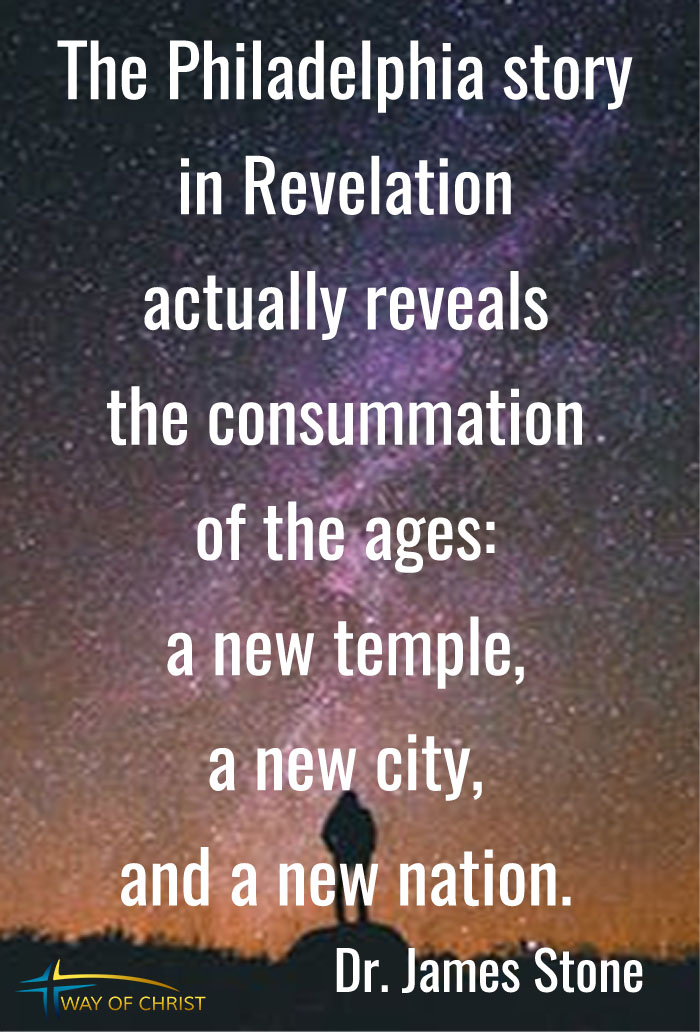The Philadelphia story in Revelation reveals the things that are and previews the things that are to come.

With the events revealed in the sixth church of the seven churches in Asia, the Philadelphia story (Rev. 3:7-13), the plot in the disclosure of “the Revelation of Jesus Christ, which God gave unto him, to shew unto his servants” becomes more intense. In revealing the solution to what the believers in the Philadelphia story were experiencing, seeds of understanding the great “day of the Lord,” as revealed in Revelation, Chapters 4 through 22, are planted. It proclaims that evil will be overcome, might will be conquered by faith, and Jesus will come quickly in every hour of temptation (original, “a putting to proof”). Believers in every generation and in every age will be enabled to experience “crown of life” living (James 1:12) in a new heaven and a new earth created for them by God’s grace working in the world. It is the essence of the Philadelphia story.
Philadelphia story reveals believers in every age can experience the manifest destiny of the kingdom of God.
The Philadelphia story gives a glimpse of things that are and of things that are to come. In minuscule form, it previews the magnificent scene of the heavenly realm: “These things saith he that is holy, he that is true, he that hath the key of David . . .” (Rev. 3:7). Then, it switches to evil in the earthly realm: “I will make them of the synagogue of Satan, which say they are Jews, and are not, but do lie” (Rev. 3:9). Finally, the cosmic conflict between good and evil: “Behold, I come quickly: hold that fast which thou hast, that no man take thy crown” (Rev. 3:11). With the final establishment of the city of God with its temple coming down from heaven, believers in every age can experience the manifest destiny of the realized kingdom of God on earth (Rev. 3:12).
Mysteriously, a door has been opened, with “the key of David,” which no man can shut (Rev. 3:8). The coming of Christ, in a special manifestations of his nearness, can keep every believer “from the hour of temptation, which shall come upon all the world, to try them that dwell upon the earth” (Rev. 3:10). John, recording the words of the risen Christ, informed the believers in the Philadelphia story,
Him that overcometh will I make a pillar in the temple of my God, and he shall go no more out: and I will write upon him the name of my God, and the name of the city of my God, which is new Jerusalem, which cometh down out of heaven from my God: and I will write upon him my new name (Rev. 3:12).
In what has been called a “day of the Lord,” the coming of Jesus, had and is marshaling a new temple, a new city, and a new nation of God on earth. The previous temple with its laws and rituals had served its purpose well but it was inadequate in producing proper behavior. The preceding city, although fulfilling its intended function, could not bring into being a “holy conversation and godliness” among the gathered people. Finally, the prior nation, even though fulfilling its mission, it, nevertheless, could not formed a theocratic government for God on the earth (Rev. 3:12).
It would take a new temple, the resurrected Jesus, a new city, the church of gathered believers, and a new nation, the spiritual kingdom of God, to bring about the consummation of the ages. Jesus operating in and among the gathered believers experiencing the power and the glory of the kingdom of God would enable the human race in every generation to experience life as it was meant to be: to love and to be loved in, by, and through the quickening power of the Holy Spirit. Is it any wonder why the followers of Jesus would be taught to pray
Our Father which art in heaven, Hallowed be thy name. Thy kingdom come. Thy will be done in earth, as it is in heaven. Give us this day our daily bread. And forgive us our debts, as we forgive our debtors. And lead us not into temptation, but deliver us from evil: For thine is the kingdom, and the power, and the glory, for ever. Amen (Matt. 6:9-13)?
The Philadelphia story reveals the opening of a new door for the Children of Israel.
When Jesus began his ministry coming “into Galilee, preaching the gospel of the kingdom of God, And saying, The time is fulfilled, and the kingdom of God is at hand: repent ye, and believe the gospel” (Mark 1:14-15), the children of Israel, to whom Christ came (Rom. 9:5), were brought to a defining moment in their long journey seeking righteousness as the people of God.
The crossroads of two opposing path to God had finally reached its consummating moment for the plan of God for the ages. Sadly, according to Paul (Rom. 9:27), most of the children of Israel, as a nation, missed the door that was opening to them to complete their destiny that was given to their father Abram so many years prior to this moment:
Now the Lord had said unto Abram, Get thee out of thy country, and from thy kindred, and from thy father’s house, unto a land that I will shew thee: And I will make of thee a great nation, and I will bless thee, and make thy name great; and thou shalt be a blessing: And I will bless them that bless thee, and curse him that curseth thee: and in thee shall all families of the earth be blessed [emphasis added] (Gen. 12:1-3).
This covenant between God and Abram would be passed on to his descendants. Jacob, the grandson of Abram and son of Isaac, had a significant encounter with God concerning this promise given to Abram. Jacob being pursued by his brother spent the night in fear praying for his deliverance. In the course of the night, he experienced what he would later call a face-to-face meeting with God (Gen. 32:28).
Jacob “wrestled” with the messenger from God throughout the night. Finally, he proclaimed that he would not give up this struggle until he was blessed. When Jacob was asked his name, it was said to him, “Thy name shall be called no more Jacob, but Israel: for as a prince hast thou power [literal meaning in conjunction] with God and with men, and hast prevailed” (Gen. 32:28). From this night forward, the descendants of Abram would be known as the Children of Israel. With the name Israel being transliterated from yis-raw-ale’, being a compound word meaning “to prevail” and “God,” the people of God, the Children of Israel, would be become the people in whom God would prevail.
With the vast majority of the Children of Israel, according to Paul in his day (Rom. 9:27), missing the door that was being opened for them to ensure the completion of the promise to Abram, obviously, God was not prevailing in their lives as he desired. This cause Paul to state quickly that their failure was not due to the ineffectiveness of the Word in the life of Israel. The problem was simply “. . . for they are not all Israel, which are of Israel” [Rom. 9:5]).
He would also identify the exact failure of the Children of Israel in his day:
Israel, which followed after the law of righteousness, hath not attained to the law of righteousness. Wherefore? Because they sought it not by faith, but as it were by the works of the law. For they stumbled at that stumblingstone; As it is written, Behold, I lay in Sion a stumblingstone and rock of offence: and whosoever believeth on him shall not be ashamed (Rom. 9:31-33).
He would also state that true Israel was not composed from the natural descendants of Abraham but existed only in those who were spiritual descendants from faithful Abraham:
Neither, because they are the seed of Abraham, are they all children: but, In Isaac shall thy seed be called. That is, They which are the children of the flesh, these are not the children of God: but the children of the promise are counted for the seed (Rom. 9:7-9).
Paul would add,
For I bear them record that they have a zeal of God, but not according to knowledge. For they being ignorant of God’s righteousness, and going about to establish their own righteousness, have not submitted themselves unto the righteousness of God. For Christ is the end of the law for righteousness to every one that believeth (Rom. 10:2-4).
The Philadelphia story revealed that all the people of Israel, however, was not trapped is this ignorant zeal to obtain righteousness by their works thereby missing the opportunity to experience the consummation of the promise given to Abram in Jesus Christ. Paul, again, was quick to point out “I say then, Hath God cast away his people? God forbid. For I also am an Israelite, of the seed of Abraham, of the tribe of Benjamin” (Rom. 11:1). He would add, “God hath not cast away his people which he foreknew . . .” (Rom. 11:2).
What God foreknew before the foundation of the world is not individuals or even a nation of individuals that would be preordained to be blessed because of who they were (Rom. 9:8-9). What God foreknew was the process by which any person could experience the righteousness of God through faith in Jesus Christ (Rom. 10:4). The preordained Christ (1 Pet. 1:19-20) is the essence of any person being blessed and numbered among the elect. Unfortunately, as with Israel, once experiencing this great blessing of adoption and acceptance the vanity of the mind of man will often shift the emphasis off of the process and on to the recipient as the one being foreknown.
Paul would then use an example out of the Old Testament to illustrate that all the people of Israel in his day did not miss the opportunity to experience the consummation of the plan of God for the descendents of Abram. He wrote,
Wot ye not what the scripture saith of Elias? how he maketh intercession to God against Israel, saying, Lord, they have killed thy prophets, and digged down thine altars; and I am left alone, and they seek my life (Rom. 11:2-3).
The people who were attempted to kill the prophet of God were the very people in whom God desired to prevail, Israel.
The answer given from God to the prophet Elijah was used by Paul to illustrate how the plan of the ages, the consummation of the promise to Abram, would be fulfilled even in his day: “But what saith the answer of God unto him? I have reserved to myself seven thousand men, who have not bowed the knee to the image of Baal” (Rom 11:4). Then, Paul added,
Even so then at this present time also there is a remnant according to the election of grace. And if by grace, then is it no more of works: otherwise grace is no more grace. But if it be of works, then is it no more grace: otherwise work is no more work (Rom. 11:5-6).
The Philadelphia story reveals why a door was closing for many of the Children of Israel.
Finally, Paul revealed why out of all of Israel, which numbered as the sand of the sea, that only a remnant would be saved (Rom 9:27): “What then? Israel hath not obtained that which he seeketh for; but the election [those who trusted in the preordained process of believing in Christ] hath obtained it, and the rest were blinded” (Rom 11:7). Again,
but Israel, which followed after the law of righteousness, hath not attained to the law of righteousness. Wherefore? Because they sought it not by faith, but as it were by the works of the law. For they stumbled at that stumblingstone; As it is written, Behold, I lay in Sion a stumblingstone and rock of offence: and whosoever believeth on him shall not be ashamed (Rom. 9:31-32).
Even though many of the people of Israel stumbled over Jesus as the way to righteousness when he came to open the consummating door of their destiny, salvation for them would still be open in which they could enter. Mysteriously, according to Paul, it was in fact the interplay between the rejection of the works of Israel and the acceptance of the faith of Gentiles that would serve as the impetus for salvation of both Jews and Gentiles (Rom. 10:12-13).
When Israel “which followed after the law of righteousness, hath not attained to the law of righteousness (Rom. 9:31), it opened a window of understanding for the Gentiles “which followed not after righteousness, have attained to righteousness, even the righteousness which is of faith” (Rom. 9:30). Paul raised the question, “Have they [Israel] stumbled that they should fall?” His answer was a resounding “God forbid: but rather through their fall salvation is come unto the Gentiles.” Salvation for the Gentiles, in turn, would “provoke them [Israel] to jealousy [original, “to stimulate alongside, that is, excite to rivalry”]” (Rom. 11:11). The attempt to produce righteousness by keeping the law greatly pales when it stands alongside the righteousness by faith in Jesus Christ. The true witness of Jesus Christ in the life of a believer is the witness that can change the world.
The Philadelphia story proclaims hope for all the people of Israel.
Hope for all the people of Israel in every generation and in every age is that the followers of Christ will not fall into the same trap that ensnared the physical nation of Israel. The disciples of Christ must “Stand fast therefore in the liberty wherewith Christ hath made us free, and be not entangled again with the yoke of bondage [attempting to live righteously by the law]” (Gal. 5:1). It is a mystery but Paul said, “I would not, brethren, that ye should be ignorant of this mystery, lest ye should be wise in your own conceits; that blindness in part is happened to Israel, until the fulness of the Gentiles be come in” (Rom. 11:25).
It is only Gentile believers that are “plentifully supplied” (fulness) in the Holy Spirit to manifest the righteousness of Christ in their lives that can point toward the lifting of the blindness of Israel. It is only when the Gentiles come into their fullness of faith in Christ that can cause Israel (whom “God hath given . . . the spirit of slumber, eyes that they should not see, and ears that they should not hear” (Rom. 11:8) because they tried to obtain righteousness by the law of righteousness), to begin the process of seeing Jesus as their Messiah. One thing is certain “all Israel [true Israel, Romans 9:6] shall be saved: as it is written, There shall come out of Sion the Deliverer, and shall turn away ungodliness from Jacob: For this is my covenant unto them, when I shall take away their sins” (Rom. 11:26-27). God will always prevail in those whose faith is in Jesus Christ.
The coming of Jesus and his preaching “the gospel of the kingdom of God . . . saying . . . the time is fulfilled, and the kingdom of God is at hand: repent ye, and believe the gospel” was indeed a defining moment for all of Israel. They were experiencing the ultimate “day of the Lord.” From the Old Testament (Joel 2:30-32) to the New Testament (2 Pet. 3:10-12), any “day of the Lord” was understood as a special time, a special day, when the will and purpose of God in the created world would be fulfilled. Within the mystery of the Spirit of God breathing life into a flesh and blood body, the ground of being for every “day of the Lord” is illustrated. For example, a human being is a creature of two different worlds (Gen. 2:7). He is a flesh and blood body that has been quickened by the breath of life, the Spirit of God. Since the body is inanimate material, it has to be infused with life by a force outside of itself. The spirit of life has to permeate the physical matter before life can be experienced by that which has no life.
From the planting of the seed to produce a flower to the coming forth of the kingdom God among men, experiencing the mystery and the miracle of the life of God being inbreathed into a materialistic world will always be challenging to the mind of man. The outward husk of the seed must decay, be brought to its end, before the essence of life within the seed can come forth in the beauty of its flower. Likewise, the kingdom of man, as amply demonstrated throughout the Scriptures (Dan. 2:1-44), must be brought down before the kingdom of God can come forth in all of its power and its glory.
The decaying of the seed and the breakdown of the kingdom of man simply means that this special disclosure, the coming forth of the miracle of life within the created world, will always come forth in the labor pains of its delivery. From the birth of a child to the birth of the nation of God, pressure will always have to be asserted upon the physical to let the spiritual break forth in newness of life. This process of new life coming forth out of the old has been decreed by God as the way in which God brings about his will and purpose in the created world (John 12:24).
This “day of the Lord” will always have both judgment and restoration. The physical being judged inadequate and the spiritual being restored is the only means by which the life of God is continually experienced by the created world (2 Cor. 4:10-11). Any “day of the Lord” will always depict the end of a present age and the coming of a new age.
The prophet Amos was probably the first to use the phrase, the “day of the Lord:”
Woe unto you that desire the day of the LORD! to what end is it for you? the day of the LORD is darkness, and not light. As if a man did flee from a lion, and a bear met him; or went into the house, and leaned his hand on the wall, and a serpent bit him. Shall not the day of the LORD be darkness, and not light? even very dark, and no brightness in it (Amos 5:18-20)?
Amos is speaking of the judgmental aspect of this special time of God that eventually would bring forth restoration. The physical world of man’s existence must first come down, must lose its control over man.
The prophet Joel gave both the judgmental and the restoration of a day of the Lord. The Lord spoke through Joel and said,
I will shew wonders in the heavens and in the earth, blood, and fire, and pillars of smoke. The sun shall be turned into darkness, and the moon into blood, before the great and the terrible [original, “to revere”] day of the LORD come. And it shall come to pass, that whosoever shall call on the name of the LORD shall be delivered: for in mount Zion and in Jerusalem shall be deliverance, as the LORD hath said, and in the remnant whom the LORD shall call (Joel 2:30-32).
Those who would call on the name of the Lord in the midst of this judgment and be restored to newness of life, would do so because the Lord said,
I will pour out my Spirit upon all flesh; and your sons and your daughters shall prophesy, your old men shall dream dreams, your young men shall see visions: And also upon the servants and upon the handmaids in those days will I pour out my spirit (Joel 2:28-29).
The restoration of the spiritual realm would produce in its participants a new way of speaking from a new way of seeing and from a new way of thinking.
With Peter quoting the prophecy of Joel to explain what was happening to the followers of Jesus on the Jewish feast day of Pentecost (Acts 2:1-40), he was understanding that the present physical age of the nation of God was giving birth to a new spiritual age. He was proclaiming, first, judgment on the old nation attempting to live by the physical law and, second, the coming forth of a new nation in which the participants would live by the spiritual grace of God. The power, the glory, and the honor of the new spiritual kingdom of God was being brought forth by this particular “day of the Lord.” By the Holy Spirit, this new nation was being infused with the life of God, Jesus Christ.
The old way of life was being brought to an end by the judgment of God, as John wrote in the Philadelphia story, because the old way had evolved into becoming the “synagogue of Satan” (Rev. 3:9). The people were constantly being taught that the path to God was the study of the law in order to follow the law in, by, and through the exercise of the mind of man. Their school of learning had become an opponent (transliterated from the original language as “Satan”), an adversary, to how God desired to work in and through his people. The door of fleshly works was being closed by “he that hath the key of David . . . and shutteth, and no man openeth” (Rev. 3:7). The people of God would no longer be known as Davidians for the world would now call them Christians (Acts 11:26).
The Philadelphia story proclaims one door closing and another door opening.
In the same “day of the Lord” in which a door was being shut, a new door was being opened for all believers in Jesus Christ. John recorded the words of the risen Christ for the believers in the Philadelphia story, “behold, I have set before thee an open door, and no man can shut it” (Rev. 3:8). In the midst of the trying times of the “day of the Lord,” the one like unto the Son of God said that the believers in the Philadelphia story had demonstrated that they were able, had the force, even though it was small in stature, to keep “the word of my patience.”
As Peter had explained some thirty years earlier, they were enabled “to be subject one to another, and be clothed with humility: for God resisteth the proud, and giveth grace to the humble” (1 Pet. 3:5). They were graced to experience the patience of Jesus enabling them to “humble [themselves] . . . under the mighty hand of God, that he [would exalt them] in due time” (1 Pet. 5:6). They were empowered by the Holy Spirit and not by the works of the law to cast all their cares upon the risen Christ because they knew that he cared for them (1 Pet. 5:7).
Living in the promise of his coming into their world in the trials of life to deliver them, the believers in the Philadelphia story knew that Christ would “keep them from the hour of temptation, which shall come upon all the world” (Rev. 3:10). In the Philadelpia story they knew that Christ would not remove the temptation (a testing time in any “day of the Lord”) but he would carry them through it without its devastating effect of distress, despair, or a sense of being forsaken and destroyed (2 Cor. 4:8-9). They had the promise of
Him that overcometh will I make a pillar in the temple of my God, and he shall go no more out: and I will write upon him the name of my God, and the name of the city of my God, which is new Jerusalem, which cometh down out of heaven from my God: and I will write upon him my new name (Rev. 3:12).
In the Philadelphia story, the true believers would dwell in a new temple, the risen Jesus Christ, in a new city, the gathered believers of saints, and in a new nation, the spiritual kingdom of God. The Philadelphia story revealed that true believers would be delivered from evil living in the power and the glory of God’s spiritual kingdom on earth. The truths revealed in the Philadelphia story can be experienced by true believers in every generation and in every age.






